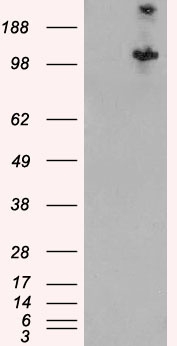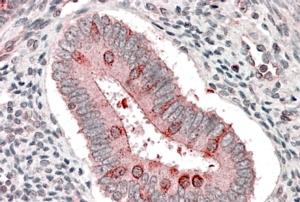Goat Anti-Hamartin / TSC1 (isoform 1) Antibody
Peptide-affinity purified goat antibody
- SPECIFICATION
- CITATIONS
- PROTOCOLS
- BACKGROUND

Application
| WB, IHC, E |
|---|---|
| Primary Accession | Q92574 |
| Other Accession | NP_000359, 7248, 64930 (mouse) |
| Reactivity | Human |
| Predicted | Mouse, Rat, Dog |
| Host | Goat |
| Clonality | Polyclonal |
| Concentration | 100ug/200ul |
| Isotype | IgG |
| Calculated MW | 129767 Da |
| Gene ID | 7248 |
|---|---|
| Other Names | Hamartin, Tuberous sclerosis 1 protein, TSC1, KIAA0243, TSC |
| Format | 0.5 mg IgG/ml in Tris saline (20mM Tris pH7.3, 150mM NaCl), 0.02% sodium azide, with 0.5% bovine serum albumin |
| Storage | Maintain refrigerated at 2-8°C for up to 6 months. For long term storage store at -20°C in small aliquots to prevent freeze-thaw cycles. |
| Precautions | Goat Anti-Hamartin / TSC1 (isoform 1) Antibody is for research use only and not for use in diagnostic or therapeutic procedures. |
| Name | TSC1 {ECO:0000303|PubMed:9242607, ECO:0000312|HGNC:HGNC:12362} |
|---|---|
| Function | Non-catalytic component of the TSC-TBC complex, a multiprotein complex that acts as a negative regulator of the canonical mTORC1 complex, an evolutionarily conserved central nutrient sensor that stimulates anabolic reactions and macromolecule biosynthesis to promote cellular biomass generation and growth (PubMed:12172553, PubMed:12906785, PubMed:12271141, PubMed:28215400, PubMed:15340059, PubMed:24529379). The TSC-TBC complex acts as a GTPase-activating protein (GAP) for the small GTPase RHEB, a direct activator of the protein kinase activity of mTORC1 (PubMed:12906785, PubMed:15340059, PubMed:24529379). In absence of nutrients, the TSC-TBC complex inhibits mTORC1, thereby preventing phosphorylation of ribosomal protein S6 kinase (RPS6KB1 and RPS6KB2) and EIF4EBP1 (4E-BP1) by the mTORC1 signaling (PubMed:12271141, PubMed:24529379, PubMed:28215400). The TSC- TBC complex is inactivated in response to nutrients, relieving inhibition of mTORC1 (PubMed:12172553, PubMed:24529379). Within the TSC-TBC complex, TSC1 stabilizes TSC2 and prevents TSC2 self- aggregation (PubMed:10585443, PubMed:28215400). Acts as a tumor suppressor (PubMed:9242607). Involved in microtubule-mediated protein transport via its ability to regulate mTORC1 signaling (By similarity). Also acts as a co-chaperone for HSP90AA1 facilitating HSP90AA1 chaperoning of protein clients such as kinases, TSC2 and glucocorticoid receptor NR3C1 (PubMed:29127155). Increases ATP binding to HSP90AA1 and inhibits HSP90AA1 ATPase activity (PubMed:29127155). Competes with the activating co-chaperone AHSA1 for binding to HSP90AA1, thereby providing a reciprocal regulatory mechanism for chaperoning of client proteins (PubMed:29127155). Recruits TSC2 to HSP90AA1 and stabilizes TSC2 by preventing the interaction between TSC2 and ubiquitin ligase HERC1 (PubMed:16464865, PubMed:29127155). |
| Cellular Location | Lysosome membrane; Peripheral membrane protein. Cytoplasm, cytosol Note=Recruited to lysosomal membranes in a RHEB-dependent process in absence of nutrients (PubMed:24529379). In response to nutrients, the complex dissociates from lysosomal membranes and relocalizes to the cytosol (PubMed:24529379). |
| Tissue Location | Highly expressed in skeletal muscle, followed by heart, brain, placenta, pancreas, lung, liver and kidney (PubMed:9242607). Also expressed in embryonic kidney cells (PubMed:9242607). |

Thousands of laboratories across the world have published research that depended on the performance of antibodies from Abcepta to advance their research. Check out links to articles that cite our products in major peer-reviewed journals, organized by research category.
info@abcepta.com, and receive a free "I Love Antibodies" mug.
Provided below are standard protocols that you may find useful for product applications.
Background
This gene encodes a growth inhibitory protein thought to play a role in the stabilization of tuberin. Mutations in this gene have been associated with tuberous sclerosis. Alternative splicing results in multiple transcript variants.
References
Polymorphic variants in TSC1 and TSC2 and their association with breast cancer phenotypes. Mehta MS, et al. Breast Cancer Res Treat, 2010 Jul 25. PMID 20658316.
A Large-scale genetic association study of esophageal adenocarcinoma risk. Liu CY, et al. Carcinogenesis, 2010 Jul. PMID 20453000.
Tandem affinity purification and identification of the human TSC1 protein complex. Guo L, et al. Acta Biochim Biophys Sin (Shanghai), 2010 Apr. PMID 20383465.
FOXO3a regulates glycolysis via transcriptional control of tumor suppressor TSC1. Khatri S, et al. J Biol Chem, 2010 May 21. PMID 20371605.
Expanding the tuberous sclerosis phenotype: mild disease caused by a TSC1 splicing mutation. Blyth M, et al. J Neurol Neurosurg Psychiatry, 2010 Mar. PMID 20185476.
If you have used an Abcepta product and would like to share how it has performed, please click on the "Submit Review" button and provide the requested information. Our staff will examine and post your review and contact you if needed.
If you have any additional inquiries please email technical services at tech@abcepta.com.













 Foundational characteristics of cancer include proliferation, angiogenesis, migration, evasion of apoptosis, and cellular immortality. Find key markers for these cellular processes and antibodies to detect them.
Foundational characteristics of cancer include proliferation, angiogenesis, migration, evasion of apoptosis, and cellular immortality. Find key markers for these cellular processes and antibodies to detect them. The SUMOplot™ Analysis Program predicts and scores sumoylation sites in your protein. SUMOylation is a post-translational modification involved in various cellular processes, such as nuclear-cytosolic transport, transcriptional regulation, apoptosis, protein stability, response to stress, and progression through the cell cycle.
The SUMOplot™ Analysis Program predicts and scores sumoylation sites in your protein. SUMOylation is a post-translational modification involved in various cellular processes, such as nuclear-cytosolic transport, transcriptional regulation, apoptosis, protein stability, response to stress, and progression through the cell cycle. The Autophagy Receptor Motif Plotter predicts and scores autophagy receptor binding sites in your protein. Identifying proteins connected to this pathway is critical to understanding the role of autophagy in physiological as well as pathological processes such as development, differentiation, neurodegenerative diseases, stress, infection, and cancer.
The Autophagy Receptor Motif Plotter predicts and scores autophagy receptor binding sites in your protein. Identifying proteins connected to this pathway is critical to understanding the role of autophagy in physiological as well as pathological processes such as development, differentiation, neurodegenerative diseases, stress, infection, and cancer.




